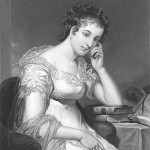6 The Clamour of New Light
Posted by Christine on Aug 29, 2014 in Ireland | 11 comments
Monday is Labor Day in the US and it seems like the right moment to write about one of my favorite poems, “The Lighthouse” by Vona Groarke, a poem that talks not about the sea, as the title might suggest, but about rural electrification in Ireland, a labor that was only completed on mainland Ireland in 1973 (some of the remote islands had to wait until 2003). I’ve been thinking about this poem lately.
Vona Groarke is gaining popularity in the US, but if you don’t know her, she was born in 1964 in Edgeworthstown, Co. Longford, where the writer Maria Edgeworth spent most her life (1768-1849) managing her father’s extensive estate and writing her many novels and treatises. Groarke was born in the maternity unit of the hospital (now a nursing home) that occupied the Edgeworth family mansion, a fact she commemorated in her 1994 poem “Patronage,” where she writes about Maria’s courageous work of writing:
While her sisters stitched bright patterns
in a lace-work of pleasantries and chat,
she took a clutch of unstrung charactersand muddy syllables, and set them in a landscape
of her own
“Patronage” was my first encounter with Groarke’s work, and the poem meant a lot to me because I had visited that house in the late 1980s, searching for some link to the genius behind Castle Rackrent and the other works. I arrived uninvited in a January downpour, but the nuns running the nursing home took pity on me and invited me in, showing me some bits and pieces from Edgeworth’s day. Maria and her sisters haunted the place for me then as they must have done to Groarke when she wrote this evocative poem, following her interest in houses, the work that happens in them, and the lives, hopes, and dreams of their inhabitants.
“The Lighthouse” considers a similar theme, the often forgotten perspective of women—women who work in the home—on important occasions, like the electrification of a rural village—an occasion for celebration for most, but not all. Stella Mews, past CEO of the Yeats Society in Sligo, told me about this poem; she actually recited it to me from memory when I visited the Yeats Museum with students from Agnes Scott in 2012. In the poem the speaker suggests that the story of the occasion is told differently by men and women. The speaker hears a version from one of these women: “I heard her tell the story another way.” A crowd of “overcoated men” are listening to the parish priest extol the virtues of “light in the darkness” in the village; they “[send] up a cheer for progress and prosperity / for all.” But in the kitchen of the storyteller’s home, three women, “resting and the day’s work done,” see it differently. When the light is switched on,
. . .three women saw themselves
stranded in a room that was nothing like
their own, with pockmarked walls
and ceiling stains, its cobweb and its grime:
their house undone and silence
by the clamour of new light.
What has seemed to augur “progress and prosperity for all” only illuminates the failures of their cleaning and fixing, “the day’s work done.” The firelight had been enough to show “the more / familiar shine of cups on the dresser. . .” but “the clamour of new light” brings scrutiny and despair they had not expected. Even the poem’s title “Lighthouse” changes in meaning as we learn to understand the women’s point of view.
“Progress and prosperity” are rarely “for all”: someone, somewhere bears the costs and endures the exposure. There is always “another way” to tell a story, a perspective that is real, important, and worthy of attention.
Some of Vona Groarke’s poems can be found online. See her page at The Gallery Press. Here is a list of her books.
Shale, The Gallery Press, Oldcastle, 1994
Other People’s Houses, The Gallery Press, Oldcastle, 1999.
Flight, The Gallery Press, Oldcastle, 2002.
Flight and Earlier Poems, Wake Forest University Press, Winston-Salem, 2004.
Juniper Street, The Gallery Press, Oldcastle, 2006.
Lament for Art O’Leary, The Gallery Press, Oldcastle, 2008.
Spindrift, The Gallery Press, Oldcastle, 2009.
X, The Gallery Press, Oldcastle, 2014.



Love this.
You are always my standard when I write these Susan! Thanks for reading.
I’m so enjoying reading these. Thanks.
Great to hear from you, Robin!
Just finished reading your first 6 blog posts from Ireland and feel as if I am on the journey with you. I clamor for the light your writing brings at the end of a long day.
Thank you Susan! And thank you for reading. I’m having fun exploring this new (to me) form. It’s great knowing you and other readers are out there!
I loved this post so much–so evocative and eloquent. But did I miss somewhere the whole poem? I will try to track it down.
So rather than clean the house, we should turn off the lights! 🙂
I’m catching up on your blog and loving it.
R.
When I’m getting the house ready for a party, there’s always a point where I say to myself, “It’ll be dark and no one will see what I see now!”
Thank you for introducing me to this poet!
You’re welcome! I heard her read Friday night at a festival–she was fantastic.